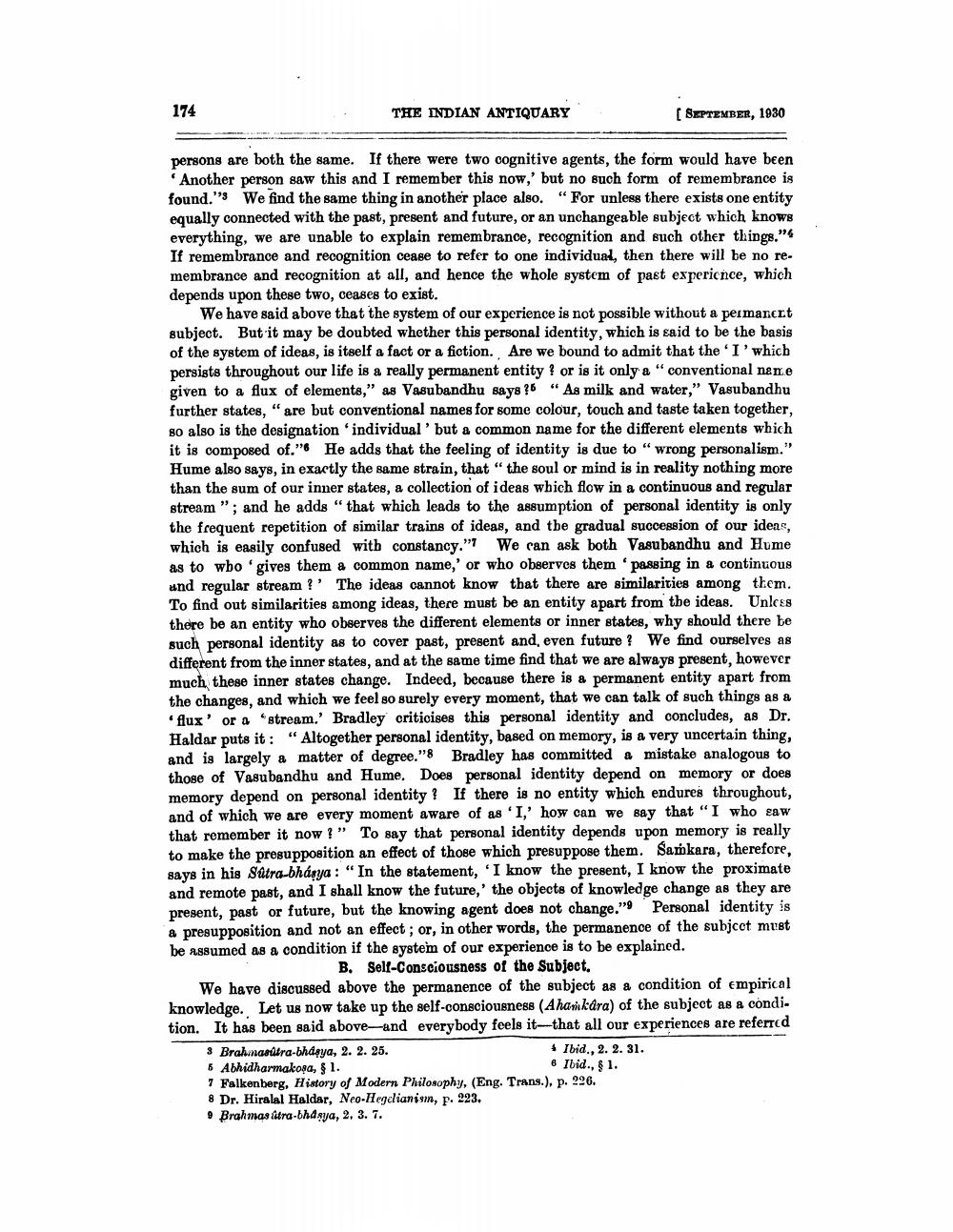________________
174
THE INDIAN ANTIQUARY
[ SEPTEMBER, 1930
persons are both the same. If there were two cognitive agents, the form would have been
Another person saw this and I remember this now,' but no such form of remembrance is found.' We find the same thing in another place also. “For unless there exists one entity equally connected with the past, present and future, or an unchangeable subject which knows everything, we are unable to explain remembrance, recognition and such other things." If remembrance and recognition cease to refer to one individual, then there will be no remembrance and recognition at all, and hence the whole system of past experience, which depends upon these two, ceases to exist.
We have said above that the system of our experience is not possible without a permanent subject. But it may be doubted whether this personal identity, which is said to be the basis of the system of ideas, is itself a fact or a fiction. Are we bound to admit that the 'I' which persigts throughout our life is a really permanent entity ? or is it only a "conventional nene given to a flux of elements," as Vasubandhu says ? "As milk and water," Vasubandhu further states, "are but conventional names for some colour, touch and taste taken together, so also is the designation individual' but a common name for the different elements which it is composed of." He adds that the feeling of identity is due to "wrong personalism." Hume also says, in exactly the same strain, that "the soul or mind is in reality nothing more than the sum of our inner states, a collection of ideas which flow in a continuous and regular stream"; and he adds "that which leads to the assumption of personal identity is only the frequent repetition of similar trains of ideas, and the gradual succession of our ideas, which is easily confused with constancy." We can ask both Vasubandhu and Hume as to who gives them a common name,' or who observes them passing in a continuous and regular stream?' The ideas cannot know that there are similarities among them. To find out similarities among ideas, there must be an entity apart from the ideas. Unless there be an entity who observes the different elements or inner states, why should there be such personal identity as to cover past, present and, even future! We find ourselves as different from the inner states, and at the same time find that we are always present, however much these inner states change. Indeed, because there is a permanent entity apart from the changes, and which we feel so surely every moment, that we can talk of such things as a *flux' or a 'stream.' Bradley criticises this personal identity and concludes, as Dr. Haldar puts it: “Altogether personal identity, based on memory, is a very uncertain thing, and is largely a matter of degree."8 Bradley has committed a mistake analogous to those of Vasubandhu and Hume. Does personal identity depend on memory or does memory depend on personal identity? If there is no entity which endures throughout, and of which we are every moment aware of as 'I,' how can we say that "I who saw that remember it now?" To say that personal identity depends upon memory is really to make the presupposition an effect of those which presuppose them. Samkara, therefore, says in his Satra-bhágya : “In the statement, 'I know the present, I know the proximate and remote past, and I shall know the future,' the objects of knowledge change as they are present, past or future, but the knowing agent does not change."9 Personal identity is a presupposition and not an effect; or, in other words, the permanence of the subjcct must be assumed as a condition if the system of our experience is to be explained.
B. Self-Consciousness of the Subject. We have discussed above the permanence of the subject as a condition of empirical knowledge. Let us now take up the self-consciousness (Aharikára) of the subject as a condi. tion. It has been said above and everybody feels it that all our experiences are referred 8 Brahmasutra-bhdaya, 2. 2. 25.
* Ibid., 2. 2. 31. 6 Abhidharmakona, $1.
6 Ibid., $1. 7 Falkenberg, History of Modern Philosophy, (Eng. Trans.), p. 226. 8 Dr. Hiralal Haldar, Neo-Hegdianism, p. 223. 9 Brahmas atra-bhagya, 2. 3. 7.




